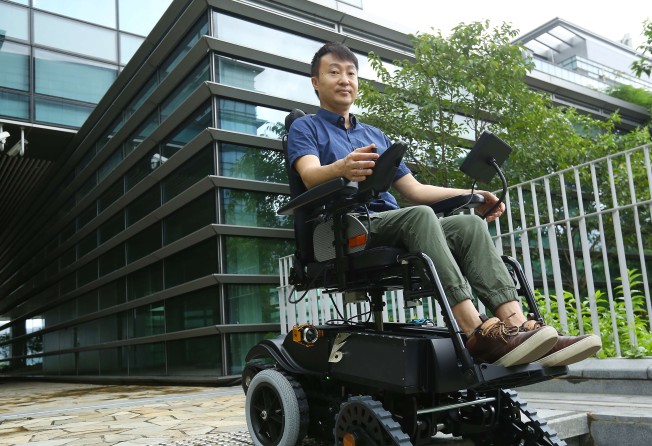Inventor’s stair-climbing wheelchair set to conquer obstacles for Hong Kong’s disabled
Alan Lee has been nominated for an Innovating for Good award in the Spirit of Hong Kong Awards, which is run by the South China Morning Post

In late 2010, Alan Lee Siu-lun’s life was changed by a television programme on accessibility in the city. It featured a public bathroom designed for disabled users; yet some steps built outside rendered the space inaccessible for its target users. The product designer thought to himself: “Surely wheelchairs could be made to conquer a few steps?”
He came up with the idea of using multiple pedrails – which resemble small tank tracks – built a miniature model to prove his concept, but then put it away, satisfied that he had solved a puzzle.
Half a year later, a forlorn story about a disabled young man who was trapped at home for years because of stairs in his building made Lee, 48, realise his design could actually be life-changing for many.
He threw his life into his invention and spent the next few years focused on realising the concept for those in need.
His B-Free wheelchair, a nod at being both barrier free and simply to “be free” from life’s limitations, is able to power over small obstacles on the road like a tank, as well as do what it set out to do – climb up and down stairs safely.
“You can kick it hard from behind and it won’t fall over,” Lee said, confident of the many safety features built into the chair’s design.
He worked with its target users to get feedback.
“I learned that it’s important to be able to adjust the chair’s height; though at first I only had young people try it out and they only want it high up. Turns out, it’s not the same for older folks,” he said.
This adjustment isn’t just handy for practical situations, such as to dine at tables of various heights. As the chair can be raised to a standing adult’s height, this offers a huge boost in one’s self esteem to be able to level with others in conversation, he said.
While he continues looking for ways to improve the machine, the first market model is ready and the pedrail design has been patented in a number of countries.
Lee, who has only technical college education up to a Form Five level, believes it helps that he’s had no formal training. “Those who studied electrical engineering at university will likely go back to the theories and methods learned, whereas I have nothing to base my imagination on, so it can run as wild as it wants.”
The Hong Kong Science and Technology Parks Corporation, where Lee now crafts his creations, has nominated the inventor for an Innovating for Good award in the Spirit of Hong Kong awards, run by the Post.
He attributes much of his success to his understanding wife, who would patiently wait for him to clear the dining table of all his sketches when she had dinner ready. “I’m totally useless with paperwork too. I wouldn’t have gotten into the Science Park without her; that application was thick as a phone book,” he said.
That’s only one of many obstacles he’s had to overcome.
Since his product is a new idea, there is no safety standard set for accreditation to gain consumer confidence. The closest is a “stair climber” standard for vehicles that transport whole wheelchairs up and down, as seen in MTR stations. “That requires the machine to climb 50,000 steps. My chair can do it, but where would I find a tester to operate it for that long?”
So Lee, kicked into inventor mode once again, is now building another machine to help his chair complete the test.